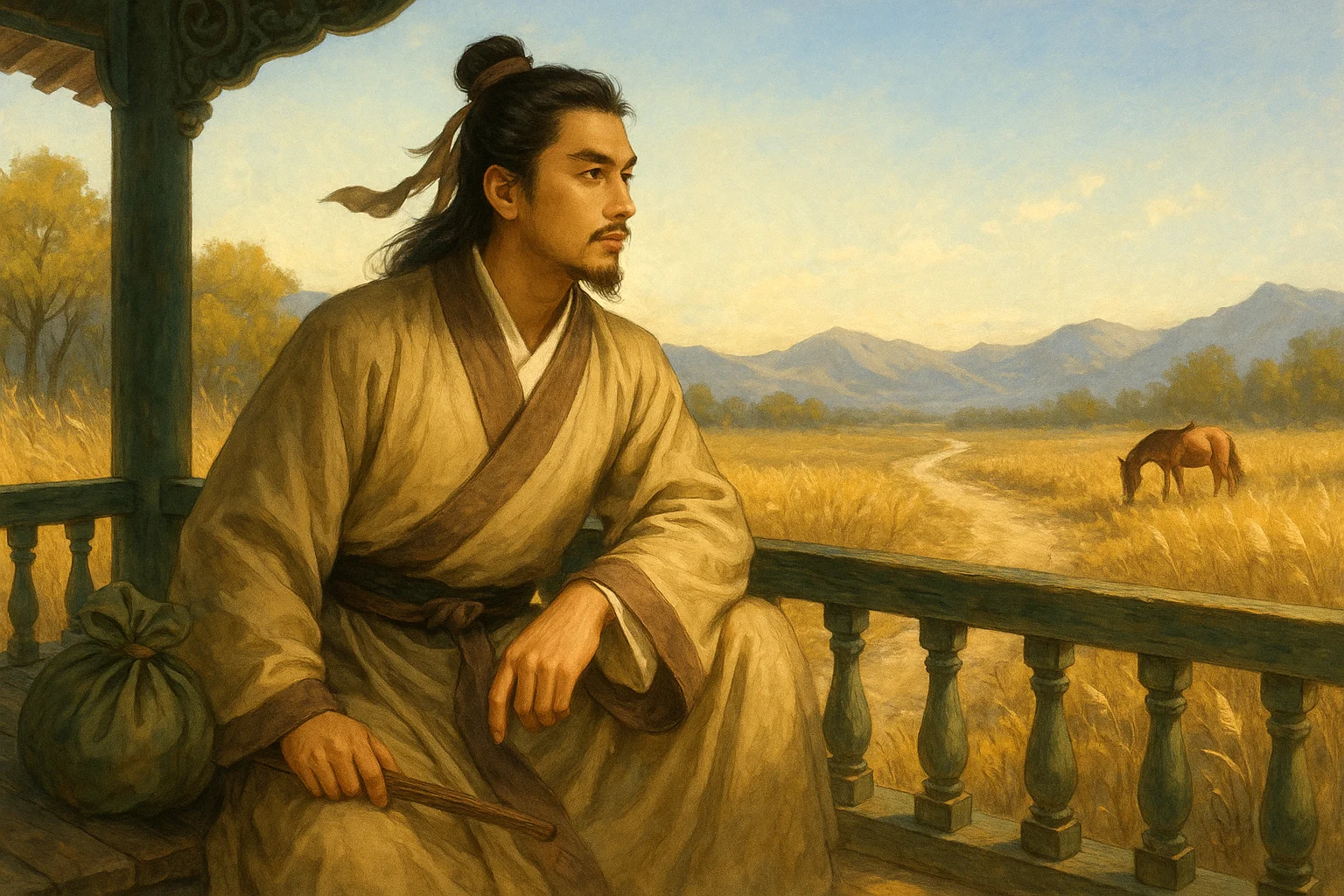Southward I see the blue-misted way,
The same path I took when exiled that day.
Long resigned to this far-flung land,
Who dreamed I’d return as planned?
Rain clears, the waning sun hangs light,
In sorrow I gaze—time slows in my sight.
Only these white hairs remain,
Past regrets too sharp to explain.
Original Poem
「望商山路」
司空曙
南见青山道,依然去国时。
已甘长避地,谁料有还期。
雨霁残阳薄,人愁独望迟。
空残华发在,前事不堪思。
Interpretation
Composed during Sikong Shu's period of exile or voluntary retirement, this poem channels the profound ambivalence of a disgraced official returning home. Mount Shang—renowned since Han times as the retreat of the "Four Elders of Shangshan"—symbolizes scholarly withdrawal from political turmoil. Through layered recollections of displacement and unexpected homecoming, the poet maps emotional landscapes onto physical ones, revealing the scars of bureaucratic life.
First Couplet: "南见青山道,依然去国时。"
Nán jiàn qīngshān dào, yīrán qù guó shí.
Due south, the verdant mountain road— / Unchanged since my exile's first departure.
The opening superimposes past and present: the road's constancy ("unchanged") becomes a mirror for the poet's transformed self. "Verdant" (青) carries Tang poetic connotations of both natural permanence and political innocence lost—a chromatic irony as the speaker's hair will later reveal.
Second Couplet: "已甘长避地,谁料有还期。"
Yǐ gān cháng bì dì, shuí liào yǒu huán qī.
Resigned to perpetual banishment— / Who could foresee this repatriation?
Here, the volta pivots on psychological shock. "Resigned" (甘) suggests hard-won acceptance of obscurity, making the unexpected return almost disruptive. The rhetorical "who could foresee" (谁料) underscores life's capriciousness—a subtle critique of imperial fickleness.
Third Couplet: "雨霁残阳薄,人愁独望迟。"
Yǔ jì cányáng báo, rén chóu dú wàng chí.
Clearing rain leaves wan twilight— / Alone, I linger at this sorrowful vigil.
Meteorological and emotional weather merge. "Wan twilight" (残阳薄) operates doubly: describing the thinly spread sunset while metaphorizing the poet's depleted spirit. "Linger" (迟) physicalizes reluctance—to move forward, or to cease remembering.
Fourth Couplet: "空残华发在,前事不堪思。"
Kōng cán huáfà zài, qián shì bùkān sī.
Only these streaked locks remain— / The past? Too bitter to revisit.
The devastating coda: "streaked locks" (华发) materialize time's passage and political weathering. "Too bitter" (不堪思) delivers finality—not just to the poem but to retrospection itself, suggesting some experiences resist even poetic sublimation.
Holistic Appreciation
This quintessential travel poem masterfully blends observations of a journey with poignant reflections on homecoming. The opening lines anchor us in landscape—the "green mountain path" serves as both physical setting and metaphor for reclusive aspirations, centering on the act of gazing into the distance. The second stanza shifts inward, tracing a psychological arc from contentment in seclusion to startled realization about the timing of return. The third stanza merges scene and emotion, where "fading sunlight" and "lingering solitary gaze" create rich visual and emotional resonance. The final lines confront the lament of aging without achievement, bringing the emotional journey to its climax while leaving space for contemplation.
With restrained language and measured phrasing, the poem conveys profound sorrow through subtlety rather than overt expression. This exemplifies Sikong Shu's distinctive aesthetic of quiet elegance. His genius for embedding life's complexities within natural imagery shines here, making this work a hallmark of his ability to refract personal history through the natural world.
Artistic Merits
- Nature-Emotion Synthesis: The poet channels complex feelings through landscape—the mountain path echoes past exile while fading sunset mirrors lingering melancholy. Scenery breathes with emotion that evolves organically with each view.
- Economical Diction, Deep Resonance: Unadorned yet worldly-wise, each carefully chosen word reveals profound feeling through simplicity—a signature of Sikong Shu's understated yet powerful style.
- Dynamic Architecture: From nostalgic gazing to life reflections, the poem progresses with perfect narrative rhythm. Its compact structure moves seamlessly from place-based emotion to blended narration before culminating in heartfelt profundity.
Insights
Beyond travelogue, this meditation on career fluctuations and life's unpredictability reveals an essential truth: while landscapes endure, human hearts remain restless. The poem voices resignation toward retreat and sorrow for time's passage, embodying the scholar's creed of service and self-reflection. In our modern era of constant motion, it reminds us that poetry and nature can still anchor the wandering spirit, offering both mirror and sanctuary for our deepest contemplations.
About the poet

Sikong Shu (司空曙), c. 720 – c. 790, courtesy name Wenming, was a native of Guangping (present-day Yongnian County, Hebei Province). A renowned mid-Tang dynasty poet, he was one of the "Ten Literary Masters of the Dali Era," alongside Lu Lun, Qian Qi, Han Hong, Li Duan, and others. Though his life lacked illustrious achievements, his poetry—marked by genuine emotion in simplicity and profound contemplation in solitude—secured him a unique place in mid-Tang literary circles.












